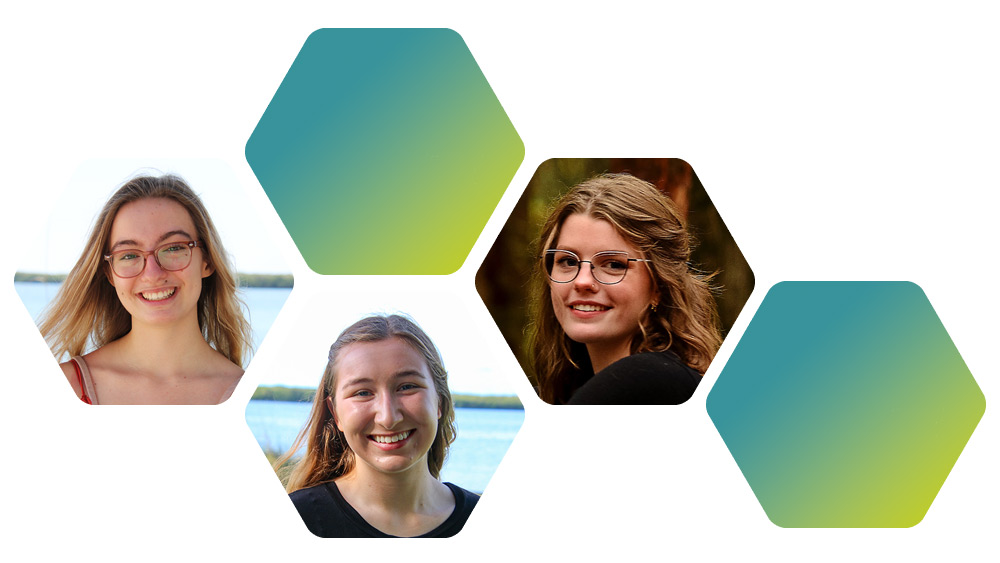Three Eckerd College sophomores were recently awarded 2022 National Oceanic and Atmospheric Administration (NOAA) Ernest F. Hollings Undergraduate Scholarships, bringing the school’s total number of recipients to 105—more than at any other college in the country.
Since 2005 the government agency has selected students from around the nation to receive up to $9,500 per year for two years of full-time study and a 10-week, full-time, paid summer internship at a NOAA facility one year after receiving the award.
On April 1, Makayla Neldner, a sophomore biology and ancient studies student from Greendale, Wisconsin, was doing work on her cellphone for the Eckerd College Search and Rescue team. She had applied for the Hollings Scholarship and knew the winners would be announced any day. “I saw ‘Congratulations!’ pop up on my phone,” she says. “It was April Fools’ Day, so, you know … Then I saw the message was from NOAA. I dropped my phone.”
Makayla sees the scholarship as a chance to do much-needed research outside the classroom. “I was hoping I would get an internship with NOAA and do research with them,” she says. “We don’t know where we’ll be sent, but I suggested the Great Lakes Environmental Research Laboratory on Lake Michigan and a marine lab on the Pacific coast in Washington state.”
She also is excited to explore the connection between biology and ancient studies. “Learning about what the Romans did to the environment—they polluted their water—a lot of that overlaps into what we’re doing today,” she explains.
“Being able to connect what people did in ancient times and what we’re doing now can show what we can learn from them.”
Maddie Reifsteck, a sophomore marine science and creative writing student from Portland, Oregon, also received the good news about her Hollings Scholarship on April 1. “And I thought it was an April Fools’ joke,” she says with a chuckle. “I know I did all the work, but I kept thinking, What if this isn’t real and I’m dreaming?”
This summer, Maddie has been invited to take part in the University of Delaware’s Marine Science Summer Intern program. “I’ll likely be working with the ORB [Ocean Exploration, Remote Sensing, Biogeography] Lab to compile a database of fish species that participate in vertical migration,” she explains. “I may also be participating in collecting sea temperatures and salinity data.
“For my Hollings Scholarship in the summer of 2023, I could end up back at the University of Delaware, but my hope is to branch out to work in a different specialty area.” An area like public policy. “Eventually,” she says, “I would really like to work alongside politicians and other scientists who are finding ways to regulate and conserve oceanic resources and environments. This includes publicizing and expanding marine protected areas and contributing to the discussion around deep-sea mining and its management.”
Eckerd’s third 2022 Hollings Scholarship winner is Gracelyn Ham, a sophomore marine science student from Eagle River, Alaska. She is spending her summer in Juneau working with the National Science Foundation’s Established Program to Stimulate Competitive Research. “We’re looking at how climate change, forest fires and glacial melting impact coastal margins,” she says.
Because of the pandemic, Gracelyn spent her first year of undergraduate studies at the University of Alaska Southeast in Juneau before transferring to Eckerd last year. She’s not sure where her Hollings Scholarship will take her. “Alaska is beautiful, but I was born and raised here, and I want to see other places,” she says. “And I’ll get an opportunity to work with NOAA as an undergraduate.”
When did Gracelyn learn she had received the scholarship? “April 1,” she answers. “I was sitting in my chemistry class, and I was so freaked out I had to remove myself.”













